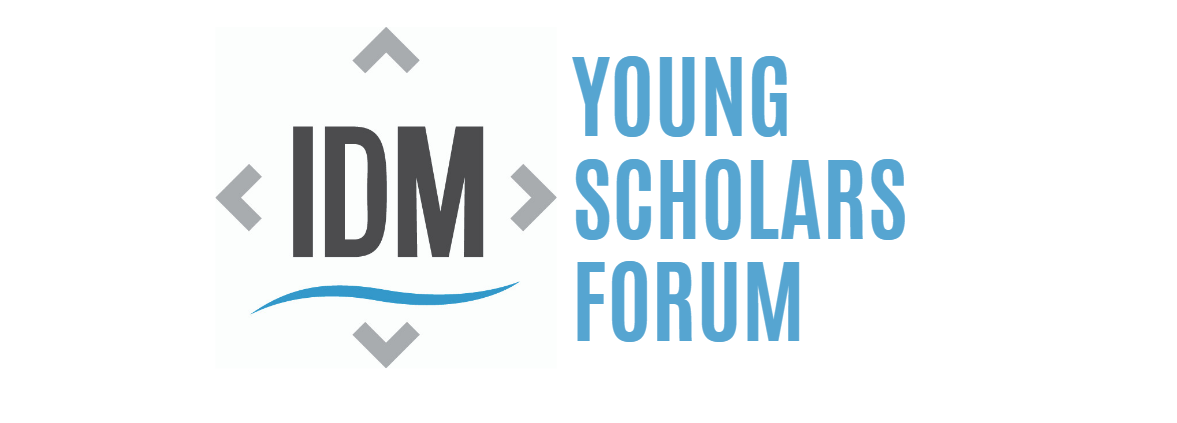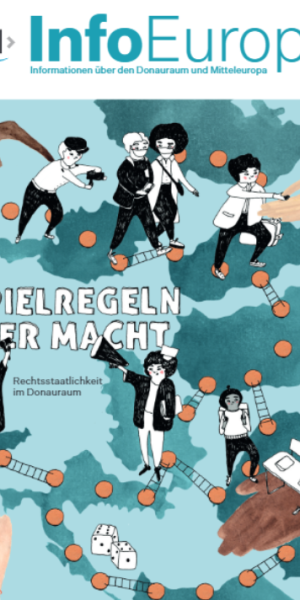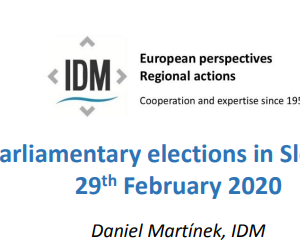7th Young Scholars Forum 2020
7th Young Scholars Forum on Central and South East Europe
“European narratives – in search for common diversity”
03 – 04 December 2020
Europeans face Europeans. The national policies of the states making up the old continent continue to shape Europe’s future at the expense of Europe as whole. The divisions among the countries are deepening, very often in a way that creates a crisis both internally and in a global context. The constant search of common narratives – as the basis for a common identity-based policy – seems to be increasingly difficult in the face of fragmented political spectrum and ever-more differing policy approaches in Europe. The purpose of the Forum is to provide space for young scientists to find what is common to all Europeans.
As part of the online event, 20 young researchers from all over Europe are invited to present and discuss their research work related to the topic of the Forum, as well as to network among themselves. The conference will take place in two days under the direction of experts within four thematically different panels:
- Europe as an area of peace and stability
- Europe as a space of cultural diversity
- Europe as a global actor
- If not the EU, is there/has there been an alternative?
Who we are looking for
We are seeking a maximum of 20 young scholars working on Central and South Eastern Europe in the fields of peace research and security policy, cultural studies, political sciences, economy, geography, sociology, media studies and history to contribute with their research to the analysis of the afore-mentioned issues and to find a common narrative that would held the future Europe together.
Aims of the Forum
- Promoting and encouraging young scholars to engage with Central and South East Europe
- Presentation of research by young scholars to a wider public
- Exchange among young and more advanced researchers on topics, methods, sources and results
- Networking
- Furthering mobility within the region
- Publication of research contributions in the IDM scientific journal „Der Donauraum“
Thematic programme of the Forum
Panel I
Europe as an area of peace and stability
For a long time, Europe has been a symbol of peace and stability. After all, the European Union itself was founded to keep the continent from repeating the horrors of the wars Europe experienced in the first half of the twentieth century. However, the narrative of universal peace and stability may be applicable to Western Europe, but is untenable for Eastern and South-Eastern Europe given the events of the 1990s, as well as the current conflict in Eastern Ukraine. Moreover, peace is a matter of course for a young generation who has experienced neither war nor totalitarianism.
Chaired by Sebastian Schäffer, Managing Director, Institute for the Danube Region and Central Europe (IDM)
Participants:
Babrik Kushwaha, University of Lille & Technical University of Applied Sciences Wildau, France & Germany
“Democracy: In Need of Relative Improvement”
Stefan Lehrner, Andrássy University of Budapest, Hungary
“Visegrad 4 – Stability in the EU or tip the scales on the stability of the EU?”
Denis Ivanov, University College London, United Kingdom
“Everything in moderation? Institutions, economic inequality and demand for populism in Hungary and Lithuania”
Isabell Burmester, University of Geneva, Switzerland
“EU and Russian hegemonic power in the shared neighbourhood: Foreign policy through coercion in the case of Moldova”
Panel II
Europe as a space of cultural diversity
Identical cultural roots are frequent argument in the creation of common European narratives. Despite the existence of so-called European cultural heritage, growing cultural diversity – mainly due to migration – is causing scepticism about a common European cultural identity. The changing European cultural environment makes the cultural mixture of Europe more detrimental than ever before.
Chaired by Daniel Martínek, Research Associate, Institute for the Danube Region and Central Europe (IDM)
Participants:
Jovana Bogojevic, University Ca’ Foscari of Venice and Heidelberg University, Italy/Germany
Why Sino-Yugoslav Cold War Cultural Links Still Matter?”
Zerina Catovic, Historical Institute, University of Montenegro, Montenegro
“Moving image – Moving Europe: Negotiating Cultural Histories“
Sergii Geraskov, National Academy of Public Administration under the President of Ukraine, Ukraine
“Re-public Policy: Religious Freedom and Religious security in Eastern Ukraine (2014-2019)”
Attila Toth, Slovak University of Agriculture in Nitra, Slovakia
“The landscape Narrative for Enhancing Common European Diversities”
Olga Usachova, University of Padua, Italy
“Mobile application as a welcoming guide: between digital mediation and culture”
Panel III
Europe as a global actor
With the rise of China as an economic giant, Russia’s increasingly assertive foreign policy and the unpredictable, Europe-distancing conduct of the United States, Europe (above all its Eastern and South Eastern part) is significantly influenced by external forces. The relative decline in economic importance and the projected demographic changes pose challenges to the EU and its neighbours both internally and externally, to which – due to fragmentation of European states and the lack of a common foreign-policy approach – the EU continues to be unable to respond effectively.
Chaired by Thomas Diez, Professor of Political Science and International Relations, University of Tübingen
Participants:
Anneliese Rieger, Andrassy University of Budapest, Hungary
“How to Strengthen Europe’s Global position with Hegel’s concept of Recognition: a strategic approach to Europe’s with China”
Magdalena König, University of Groningen, Netherlands
“The role of transnational counter-terrorism in the EU process of enlargement towards the Western Balkans”
Mirali Mirhashmli, Institute of Advanced Studies of Köszeg, Hungary
“The relations between EU and Azerbaijan and the tensions between Europeanization and stabilitocracy”
Paul Philip Kowas, University of Applied Sciences of Wildau, Germany
“The common agricultural Policy of the European Union and its possible future effects on the reduction of greenhouses gases of the agricultural industry”
Panel IV
If not the EU, is there/has there been an alternative?
Despite being the most extensive project of political integration in the world, the European Union has experienced a series of crises in recent years such as the Eurozone debt crisis, the refugee crisis, the Brexit or the rise of populist, strongly nationally-oriented parties across the continent. On the one hand, the enlargement of the EU in Eastern and South Eastern Europe seems to be stuck, on the other hand, the deeper integration of the EU members is not evolving as previously expected, where there is growing scepticism about the European project in general. Brexit, the dismal socio-political situation and the resulting protests in some (non-)EU member states, and the democratic backsliding in Central Europe – all this creates the ideas of a different Europe: a Europe of sovereign nation states, a federal Europe or a Europe in the form of a republic.
Chaired by Bettina Rausch, President of the Political Academy of the Austrian People’s Party
Participants:
Mátyás Máté, Corvinius University of Budapest/University of Tartu, Hungary/Estonia
“Lessons from the backlash: steps towards a more equitable EU”
Filip Fila, Institute for Social research in Zagreb, Croatia
“The Visegrad group – a united front against a common European narrative?”
What you need to apply
- a full academic CV
- an abstract (max. 400 words) of the research paper that shall be presented and discussed at the symposium
- the participation fee of € 100,-
Costs for travel expenses (up to € 200,-) as well as board & accommodation (single rooms) will be reimbursed by the IDM.
IMPORTANT: As the restrictive measures regarding mobility associated with the epidemiological situation and future development of the coronavirus pandemic cannot be predicted, the participants are asked to arrange all financial issues – participation fee, travel costs – only in the weeks before the Forum.
Applications for participation should be submitted in English via e-mail by September 30, 2020.
Please send your application to:
Institute for the Danube Region and Central Europe (IDM)
Mr. Daniel Martínek | d.martinek@idm.at
Language of the Forum: English



